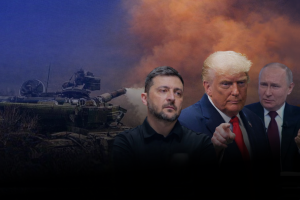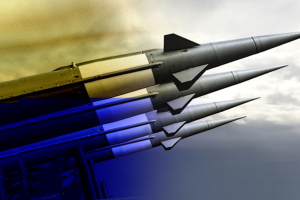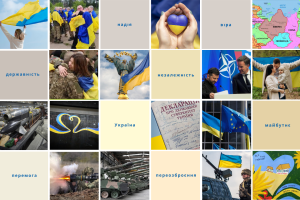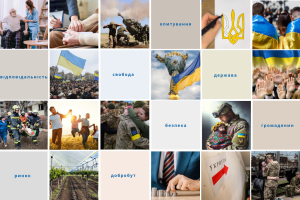The results of a public opinion poll conducted by the Ilko Kucheriv Democratic Initiatives Foundation in cooperation with the Razumkov Center sociological service from March 23 to 30, 2023. The survey was conducted by face-to-face interviews in all regions of Ukraine, except for the Autonomous Republic of Crimea, Donetsk and Luhansk regions. In Zaporizhzhia, Mykolaiv, Kharkiv, and Kherson regions, the survey was conducted in the government-controlled territories of Ukraine where no active combat actions are taking place.
The survey was conducted using a stratified multi-stage sampling using random selection at the first stages of sampling and a quota method of selecting respondents at the final stage (when respondents were selected according to gender and age quotas). The structure of the sample reflects the demographic structure of the adult population of the surveyed regions as of the beginning of 2022 (by age, gender, type of settlement).
2017 respondents aged 18 and older were interviewed. The theoretical sampling error does not exceed 2.3%. At the same time, additional systematic sampling deviations may be caused by the consequences of Russian aggression, in particular, the forced evacuation of millions of citizens.
The survey was funded by donations collected as part of the project Sustainability4Ukraine: Support Local NGOs in Ukraine through the website of the charitable organization ICF "Ukrainian Philanthropic Marketplace" dobro.ua.
Main research findings
More than a third of Ukrainians named the defense of Kyiv and the rapid occupation of the South of the country (Kherson region and the Azov Sea coast) as the events of the full-scale war that had impressed them the most. More than a quarter of Ukrainians mentioned the destruction of the Russian Navy's Black Sea Fleet flagship, the Moskva missile cruiser, on April 14, 2022. The significance of this event has been repeatedly emphasized in the media, in particular because over the past 40 years, it was the first time in the world that a flagship was sunk. This event was made even more symbolic, firstly, by the consonance of the cruiser's name with the capital of the aggressor state, and secondly, by the fact that Ukraine had a much less powerful navy than the Russian Black Sea Fleet, while Russia used its fleet to create the illusion of "imperial power."
Many other tragic and heroic episodes of the war have also been imprinted in the memory of Ukrainians: the occupation of the Zaporizhzhia nuclear power plant, protests of Kherson residents against the occupiers, the supply of Western weapons, massive missile strikes, etc. According to the survey results, no single event or two are the most memorable for Ukrainians. There are many stories of the full-scale war, some of them heroic and tragic at the same time, and the details of many of the circumstances of these events will be revealed in the future. Reflection on these events, their symbolism, forms of commemoration and honoring their participants will become the foundation of a new collective memory of Ukrainians and collective identity in the future.

Operations such as the defense of Bakhmut or Azovstal are already being reproduced in the cultural products, becoming "spaces of memory" forming collective memory and identity of Ukrainians.
As for regional differences, the expected trend is that residents of specific regions tend to emphasize in their memories of the war the events that took place in their own regions. For example, the defense of Kyiv impressed about 50% of respondents in the Center, while in the East this figure does not exceed 17%. The rapid occupation of the South was most memorable for residents of the Southern macro-region, while the counteroffensive of the Armed Forces of Ukraine in Kharkiv region was a landmark event for residents of the East of Ukraine.
Therefore, the government bodies responsible for national memory policy should already pay special attention to events that are of particular importance for residents of different regions and include such stories in the national commemoration process. Citizens should feel that every local or regional event, whether tragic or victorious, is an integral and significant part of the national resistance to Russian aggression. This will enrich national memory and play an important role in strengthening national unity in the future.

- As it was earlier, about 92% of Ukrainians believe in Ukraine's victory in the war against Russia. There are no significant regional differences: residents of all regions of Ukraine overwhelmingly believe that Ukraine will defeat the aggressor.

- In an open-ended question about which events of the war Ukrainians personally associate with grief or despair, respondents mostly mentioned the consequences of war crimes committed by Russia rather than specific events. 24% of Ukrainians named the death of people as the most traumatic event during the war. Another 22% also associate despair and grief with bombings and rocket attacks, and 16% mention massacres and mass murders of the population in the occupied territories of Ukraine.

Thus, Russian war crimes have already been imprinted in the collective memory of Ukrainians as an extremely traumatic event, which emphasizes the importance of restoring justice and punishing all those involved in their committing.
As for war crimes, the most striking in the memory of Ukrainians are the executions and torture of Bucha residents by the occupiers, which were revealed after the de-occupation of Kyiv region and chronologically became the first evidence of the occupiers' inhuman treatment of Ukrainians. The defense of Mariupol, which has already become part of the collective memory of Ukrainians, also contains tragic episodes of war crimes committed by the occupiers, e.g. the murder of civilians hiding in the Mariupol Drama Theater and the murder of part of Azovstal defenders in the Olenivka prison camp.
Many other war crimes committed by the occupiers are also related to the purposeful killing of civilians due to missile attacks, indiscriminate shelling of frontline cities, and torture of residents of the occupied territories. These events, causing collective trauma, will also need to be adequately addressed in the future national memory policy.

- The survey revealed that the most important events contributing to maintaining morale and associated with pride and victory are both specific military operations, including the liberation of Kherson (15%), the defense of Kharkiv (11%), and the de-occupation of Kyiv region (10%), as well as general positive emotions from the liberation of the occupied territories (16%), pride in the Ukrainian military (10%), and a sense of social cohesion (9%).

- The survey results also showed that the events that indicate that Ukraine is not left alone with the aggressor are a source of hope and optimism for Ukrainians. The following narratives can be distinguished: 11% of respondents were filled with hope because of weapons that Ukraine received from its foreign partners, and 10% were optimistic about the support of Ukraine by other countries in general. It was expected that news of successes on the battlefield would bring hope: 9% of respondents mentioned offensive operations, de-occupation and liberation of Ukrainian territories.

- Countries that provided comprehensive assistance to Ukraine during the war will have an important place in the collective memory of Ukrainians. In particular, more than half of the respondents believe that Poland and the United States helped Ukraine the most, while 46% of respondents share the same opinion about the United Kingdom. It is worth noting that these three countries also provided the largest amount of military assistance to Ukraine, especially in the first, most critical and difficult months of the war. However, some other countries, such as Lithuania, Latvia, and Estonia, have provided Ukraine with the most aid relative to their own military budgets that Ukrainians also appriciate very much.

- An important factor shaping the modern national memory is the recognition of the exceptional role of Ukrainian Defense Forces, volunteers, and the entire Ukrainian people in repelling Russian aggression. Given this context, central and regional authorities must realize and accept their supplementary role in ensuring the successful defense of the country in the first months of the war.
In particular, 78% of Ukrainians share the opinion that the greatest role in repelling the Russian offensive was performed by the Ukrainian Defense Forces - the Armed Forces of Ukraine, the National Guard, the Territorial Defense Forces and other law-enforcement and paramilitary units. The second most common answer is that the main contribution in repelling Russian aggression was made by the entire Ukrainian people.
The third common opinion is the recognition of the role of volunteers and patriotic citizens in repelling Russian aggression - this opinion is shared by over 46% of respondents, with the highest result in Central Ukraine.
Although the President and Government of Ukraine have an extremely high level of legitimacy and recognition of their role in the defense of Ukraine, only 24% of respondents consider the role of the central government (President and Government) to be the main one in the first months of the war, with a relatively balanced distribution of this opinion across all regions of the country.
Curiously, despite the relatively lower rates of recognition of the role of the Defense Forces and the Ukrainian people in the fight against the occupier, the East has a significantly higher rate of recognition of the partisans' role in resisting Russians in the occupied territories - this opinion is shared by a quarter of the macro-region's residents..

The Role of Personalities and the "Human Factor" in Modern National Memory
Historical figures, prominent men and women, play an important role in national consolidation. With this in mind, we used a series of questions to find out who citizens currently consider to be outstanding leaders who have helped to successfully resist Russian aggression.
- Answering the open-ended question "Which politicians or public figures played an important role in the country's defense?", 65% of respondents mentioned President of Ukraine Volodymyr Zelenskyy, 47% - Commander-in-Chief of the Armed Forces of Ukraine Valeriy Zaluzhnyy.
Other heads of Ukrainian military agencies and generals, as well as civilian government officials, followed the ranking with a significant margin. Among civic activists and volunteers, Ukrainians highlighted volunteer Serhiy Prytula.

- In 2022, visits by foreign leaders and declarations of their support for Ukraine were highly publicized events. According to the survey, it was foreign aid (13.5%) and support from partners (11.8%) that gave Ukrainians the most hope and optimism. Among foreign politicians or public figures, Ukrainians believe that U.S. President Joe Biden (58%), Polish President Andrzej Duda (50%), and former British Prime Minister Boris Johnson (49%) played the most important role in supporting Ukraine. Significantly fewer people mentioned French President Emanuel Macron (10%) and German Chancellor Olaf Scholz (9%).

- The attitude of Ukrainians toward the leader of the Russian Federation is clear and straightforward: 94% of respondents believe that Putin is a modern-day Hitler.

- Public opinion is always influenced by the media, social networks and other sources that inform citizens about events in Ukraine and the world. Often, these same media not only inform, but also offer viewers an interpretation of events, inviting experts who analyze the facts covered in the news for readers/viewers.
After February 24, 2022, the demand for military expertise in Ukraine increased significantly as citizens sought to analyze and draw conclusions from the dozens and hundreds of fragmented facts they learned from the media. This led to an increase in the media visibility of military experts. To a large extent, they were also involved in shaping the collective memory of the war events, as they were the ones who promptly offered their audience interpretations of current events both on the battlefield and in the security and defense sector in general.
Therefore, the Democratic Initiatives Foundation included an experimental close-ended question about citizens' assessment of various actors who often act as experts or sources of exclusive information about events during the war. The data obtained will help to understand how the recognition and reputation of certain politicians and experts affects the spread of certain narratives about the war and how this can shape the perception of the war by different social groups.
Thus, according to the survey, the people who cover the events of the war most competently and in a balanced way include representatives of the Ukrainian government (Volodymyr Zelenskyi - 56%, Mykhailo Podoliak - 34%, Oleksiy Danilov - 21%, etc.) and independent experts, journalists and bloggers (Oleh Zhdanov - 23%, Yuriy Butusov - 17%, Vitaliy Portnikov - 13%, Serhiy Sternenko - 11%, etc.).
On the ruins of the "Russian world": what share of Ukrainians still remain loyal to Russia
Despite the high level of support for the Ukrainian Defense Forces and the condemnation of Russia's crimes of aggression, occupation and genocide, some citizens remain vulnerable to Russian influence.
In particular, as of March 2023, almost 12% of respondents do not consider the Revolution of Dignity to be a righteous uprising of the people, and 11% are unsure of their attitude to the events that took place in 2013-2014.

Among those who do not support Euromaidan, there is the largest share of supporters of "peace at any cost" with Russia - 17%. 42% of them also believe that some compromises with the aggressor are possible, although not all of the compromises. At the same time, among respondents who consider the Revolution of Dignity to be a just uprising of the people against authoritarian rule, 72% tend to believe that the war can end only if Ukraine wins over Russia, i.e. they do not tolerate any compromises with the aggressor.

Another interesting dimension of analysis is the attitude towards religious propaganda which is another instument of Russian soft power in Ukraine. Russian propaganda in Ukraine is spread by the Russian Orthodox Church through its proxy, the Ukrainian Orthodox Church of the Moscow Patriarchate.
It is worth noting that during the survey, there was a conflict between the Ukrainian authorities and the UOC-MP, in particular over the termination of the UOC-MP's lease agreement for the Kyiv Pechersk Lavra. As of March 2023, more than 50% of Ukrainians in each region considered the activities of UOC-MP to be a factor that facilitated the Russian invasion, while up to 18%, depending on the region, disagreed.

The attitude to Maidan as an event of modern history is also related to the interpretation of the UOC-MP activities. Among those who support the Revolution of Dignity, the vast majority (76%) agree that the activities of the UOC-MP helped the Russian aggression. Instead, among those who do not support the Maidan, about half have a tolerant attitude to the activities of the UOC-MP.









